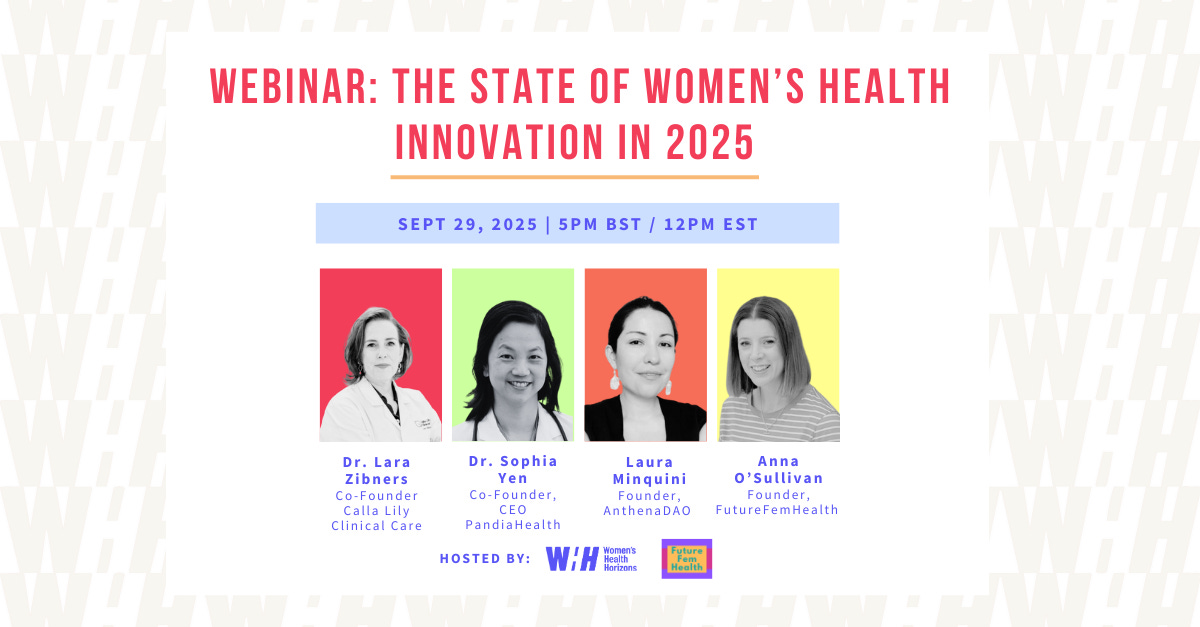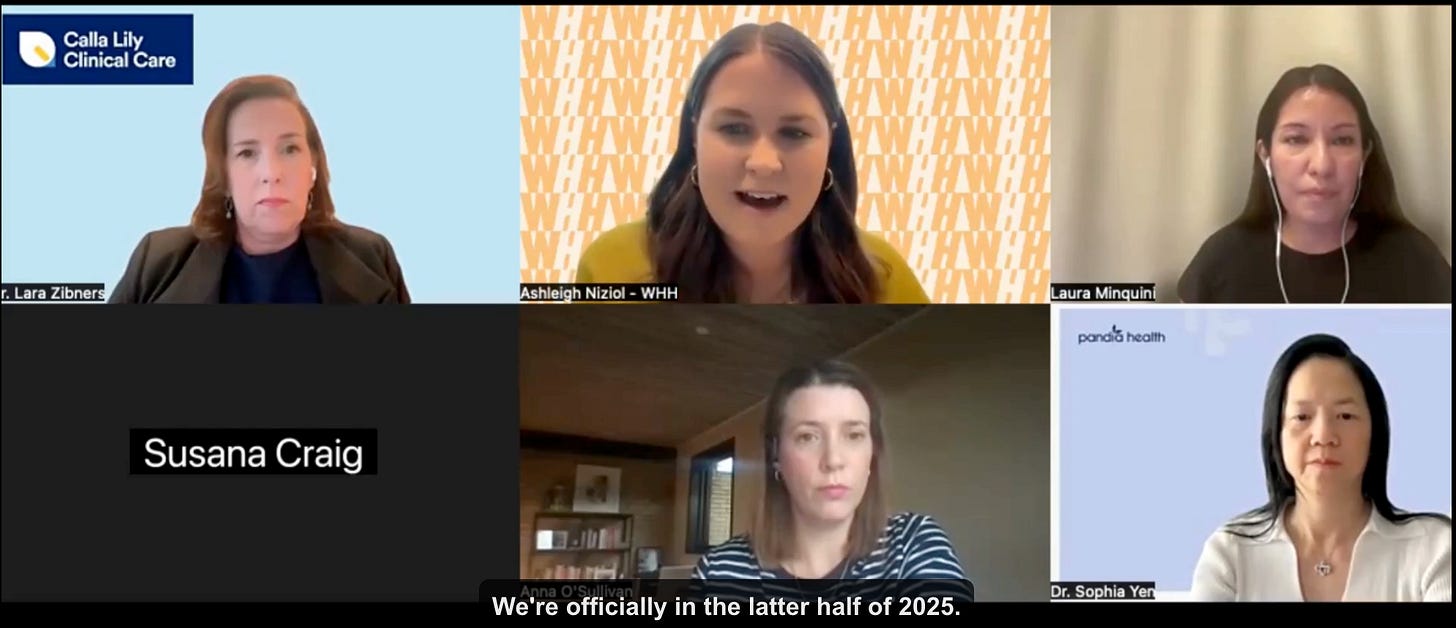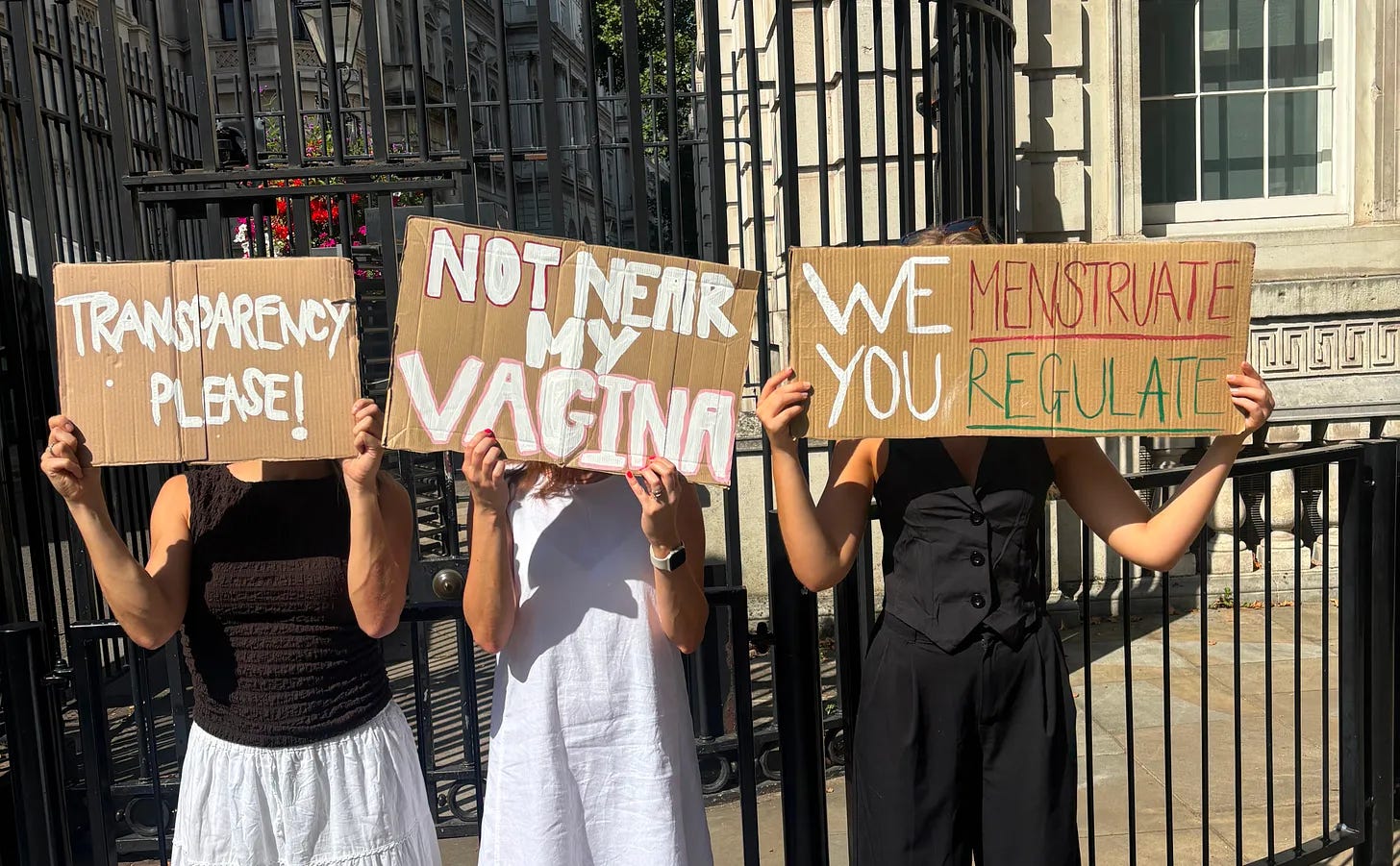💌 Issue 116: $100m women's health Co-Lab | Neura Health's virtual neurology platform | Flo Health settles in privacy case | Period brands demand overhaul
The global weekly briefing on women's health innovation and FemTech
Welcome to FutureFemHealth, (w/c October 1 2025) — we’re trusted by 8,600+ investors, innovators and leaders to decode the funding flows, breakthrough ideas and policy shifts transforming the sector.
🌟 In this week’s briefing:
💰 ICONIQ launches $100m Women’s Health Co-Lab
🔥 Neura Health raises $11.4m Series A to expand virtual neurology platform
🛑 Flo Health to pay $8m settlement in privacy case
❤️ Period brands unite to demand UK tampon safety overhaul
Got news to share from the world of FemTech and women’s health innovation? Let me know at anna@futurefemhealth.com
But first…where’s the future taking us?
That was the big question at our Women’s Health Horizons x FutureFemHealth roundtable earlier this week.
Over an hour, our panel dug into everything from funding bottlenecks to censorship, and the shifts that are finally pushing women’s health beyond its “bikini medicine” reputation. As Dr. Lara Zibners put it, “We’re still digging ourselves out of the hole left when women weren’t included in research.”
Funding was a hot topic too. AthenaBIO’s Laura Minquini described the “Valley of Death” where science-backed solutions get stuck in the lab, while Dr. Sophia Yen was clear about the founder’s reality: “I’ll take money in any way, shape, or form — but we need more vehicles that actually match the realities of building in women’s health.”
And when it comes to scaling, censorship emerged as a persistent barrier: bans on everything from pregnancy pillows to period products are frustrating and create “distribution risk” that puts off investors.
👉 In my full write-up (with the recording embedded), I’ve pulled out the five big signals we discussed that are shaping women’s health innovation today. WATCH HERE.
This was one of the most candid discussions on women’s health I’ve been part of - I hope you enjoy!
💰 Capital flows: where are investors placing bets?
📌 GLOBAL: ICONIQ launches $100M Women’s Health Co-Lab. On the eve of UNGA, ICONIQ - the investment firm tied to Mark Zuckerberg* and Jack Dorsey - has unveiled a $100M women’s health fund with Co-Impact. Backed by Melinda French Gates and her daughters, the Co-Lab will provide unrestricted capital to 22 groups tackling maternal mortality, reproductive rights, and gender-based violence across the US and Global South. The move follows Gates’ own $100M initiative earlier this month. It all feels like a very welcome and coordinated push to close glaring funding gaps. (Continue reading: Forbes)
*(Given Meta’s ongoing censorship of women’s health content on its platforms, there’s a certain irony in a Zuckerberg-backed investment firm turning attention to women’s health isn’t there?!)
📌 U.S: Neura Health raises $11.4m Series A to expand virtual neurology platform. Neurology is one of the most backlogged specialties in U.S. healthcare, with patients often waiting six months for an appointment. The burden falls hardest on women: migraines affect women 3x more often than men. Female-founded Neura Health wants to collapse that gap: its full-spectrum virtual platform covers migraines, epilepsy, dementia, and more, pairing video visits with AI tools, symptom tracking, and ongoing coaching. Notably, this $11.4M Series A was led by the American Heart Association’s Go Red for Women Venture Fund - the fund’s first-ever investment. With the funds, Neura now plans to expand nationally. (Continue reading: FutureFemHealth)
📌 BELGIUM: The Sunrise Group raises $29M to expand digital sleep clinic. Sleep disorders are notoriously underdiagnosed, with nearly 80% of sleep apnea cases going untreated. Sunrise Group — maker of a chin-mounted sensor — is tackling this gap through Dreem Health, its digital clinic offering diagnostics, teleconsults and treatment. For women, Dreem launched a dedicated program in March 2025 for issues linked to pregnancy, PCOS, perimenopause, menopause and PMS. The new $29M round, led by Eurazeo with Amazon’s Alexa Fund, will expand Dreem nationwide and into markets like France. (Continue reading: Fierce Healthcare)
📌 U.S: Visana Health raises $24M to scale virtual medical home for women. Many women silently manage 3–4 chronic conditions at once — driving costs up for employers and straining quality of life. Visana’s virtual medical home targets that gap, already covering gynecology, GI, and mental health. It will now expand into weight loss, cardiometabolic care, and chronic conditions including diabetes, thyroid disease, and CVD. This Series A round was led by Noro-Moseley Partners. (Continue reading: FutureFemHealth)
📌 THE NETHERLANDS: Rapidemic wins $2.7M Gates grant to push forward power-free STI diagnostics. Women disproportionately bear the burden of untreated sexually transmitted infections, particularly in low- and middle-income countries. Rapidemic, a molecular diagnostics startup, has received a $2.7 million grant from the Gates Foundation to address this gap with its ultrarapid testing platform that doesn’t need electricity or lab infrastructure. (Continue reading: FutureFemHealth)
📌 U.S: BeSound raises $6.8 million for breast cancer screening startup. Backed by Oura’s CEO Tom Hale among others, BeSound aims to catch what mammograms miss or insurance won’t cover. Beginning in LA with a $350 price point, the startup is targeting women under 40 and also those with dense breasts with a “front door” offer of initial screening before sending patients to doctors for next steps. Eventually, founder Bailey Renger is interested in expanded to all forms of ultrasound-based imaging for women’s health. (Continue reading: Fortune)
📌 U.S: Mamaya Health raises $3 Million to expand women’s mental health platform. Founded in 2019, Mamaya delivers hybrid mental health care tailored to women and families, offering services that span fertility, pregnancy, postpartum, menopause, and beyond. Its model combines virtual therapy, psychiatry, peer support, and AI-powered care navigation with a growing provider network. This Series A growth equity round was led by LFE Capital and will be used to scale and develop partnerships with health systems. “Care needs to be simple, accessible, and meet women where they are — because therapy is a lifeline, not a luxury,” says CEO Amy Green. (Continue reading: FutureFemHealth)
This week’s poll
Last week’s poll asked ‘what was the main reason you decided to work in women’s health?’. The answers were clear cut - with 50% of you saying it was because of your own lived experience and another 24% because of a sense of justice. Just 6% said you work in women’s health mainly because of the business opportunity or because your skills are a good fit. Oh, and 14% of you don’t work in women’s health anyway!
👩🏽💻 Do you have a juicy question we could ask our readers? Let me know at anna@futurefemhealth.com!
🌟 Industry moves and strategic shifts

📌 U.S: Flo Health to pay $8m settlement in privacy case. A number of high-profile cases and reports in the last decade have highlighted concerns about reproductive health apps collecting, sharing and even selling more data than is necessary. Court filings now show Flo Health will pay into a proposed $59.5 million settlement fund for alleged mishandling of data between 2017 and 2019 - with Google agreeing to contribute $48 million and Yahoo-owned Flurry will add $3.5million. As part of the proposed deal, Flo, Google and Flurry deny wrongdoing, insisting that they neither shared nor misused data. (Continue reading: FutureFemHealth)
📌 U.S: Millie launches perimenopause, menopause care. Originally focused on maternity care since launch in 2022, California-based Millie will now introduce in-person and virtual support with hormone therapy, nonhormonal treatments, vaginal treatments and lifestyle strategies. It’s a sensible expansion as Mille’s original customer base ages into the midlife phase. As CEO and founder Anu Sharma emphasises: “Wherever they establish care, for maternity, is often where they want to kind of continue to stay.” (Continue reading: Fierce Healthcare)
📌 U.S: Bird&Be brings fertility care to Ulta Beauty. By placing reproductive health supplements and at-home fertiltiy testing kits on the same shelves where women shop for beauty and self-care, Bird&Be wants to meet consumers where they already are. While this is Bird&Be’s first major U.S retail partnership, the bigger story is the cultural shift in how fertility support is packaged and perceived and the growing consumerization of reproductive health. More blurred lines between health and wellness. To me, it again raises questions about how consumers are expected to assess products for trust and effectiveness - does the setting they are sold in matter? (Continue reading: Drug Store News)
📌 UK: Student coalition launches new digital directory. Students from leading UK universities including Imperial, Cambridge, Oxford and UCL are launching ‘Women’s Health World’ a new central hub connecting young talent with startups, researchers and innovators. If you’d like to list your startup (for free) reach out to founder sophia.mok@hotmail.com.
📄 Policy watch: risks and opportunities
📌 UK: Period brands unite to demand UK tampon safety overhaul. Despite being used internally in one of the most absorbent areas of the body, tampons are not subject to the same rigorous testing, labelling, and safety protocols required for many other consumer health products such as plasters. Five challenger brands - TOTM, Daye, Here we Flo, Mooncup and Yoni - have formed a coalition to urge the UK Government to tighten safety regulations following mounting evidence of harmful substances in widely used products. (Continue reading: FutureFemHealth)
📌 UK: Landmark report reveals hidden barriers to NHS innovation. Only 28% of innovators interviewed for this report had successfully been able to procure and scale across the NHS - an important way of scaling in the UK. Fragmented regulation, slow procurement processes, and limited support for NHS staff are holding back technologies that could improve patient care, ease workforce pressures, and drive economic growth. Reducing the barriers could transform the healthcare system and position the UK as a pioneer in health advancement and the export of health innovation globally. This report from UCL Partners sets out a series of recommendations for change. (Continue reading: UCL Partners)
📌 GLOBAL: International Court of Justice says climate inaction threatens women’s rights. The International Court of Justice has declared that governments have binding obligations to tackle climate change — and failure to act threatens fundamental rights, especially for women, girls, and Indigenous communities. While advisory and non-binding, the opinion strengthens legal challenges, spotlights gender-responsive policy, and equips activists with sharper tools to demand accountability. (Continue reading: Economist Impact)
📌 CANADA: Government of Canada improves access to sexual and reproductive health services. CAD$13m in funding will go to 15 community-based organizations filling gaps in knowledge, training and resources, stigma and discrimination, and geographic isolation. (Continue reading: Canada.ca)
That’s all for this week! If you’ve missed any previous newsletter issues catch them all at futurefemhealth.com and do make sure to follow us on LinkedIn.
Anna
PS. FutureFemHealth reaches 8,600+ decision-makers and professionals in women’s health each week - from investors and founders to healthcare leaders and corporates. To explore partnership opportunities or request our media pack contact: anna@futurefemhealth.com







